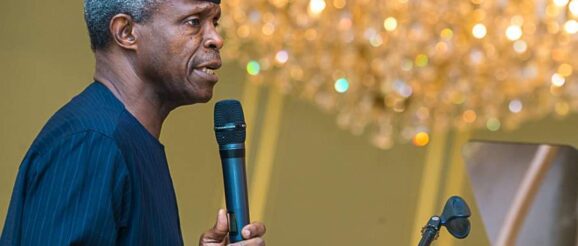Osinbajo Urges Nigerian Youths to Solve Societal Problems through Innovation

The Vice President of Nigeria, Prof. Yemi Osinbajo, has told Nigerian youths to reverse the negative effects the COVID-19 pandemic has had on the society through innovative thinking.
Prof. Osinbajo stated this on Thursday at the virtual Townhall meeting of the Law Students Association of Nigeria (LAWSAN) themed “How to build the right mindset for a better Nigeria, post COVID-19”.
He pointed out that the pandemic has caused major crises in the economic and health sector and exposed the holes in those systems. While noting that the pandemic created a lot of difficulties, he urged the youths to use it as a turning point to resolve major challenges through innovative thinking.
The Vice President said, “We are faced with a two-fold global crisis. First is a health crisis and then there is an economic crisis and the combined effects have resulted in possibly the greatest socio-economic crisis in recent history. At the moment, we are also at a turning point with new opportunities to turn under-consumption into thriving business models if only we effectively innovate. We are seeing some of this emerge already.”
He added, “Because we don’t, realistically, know when this pandemic will end, speaking of a ‘post-COVID Nigeria’, is not actually of much use. The better approach, in my view, is to ask ourselves where the opportunities in this global crisis lie.”
Prof. Osinbajo also pointed out that the current situation is unprecedented to everyone. According to him, no one has the answers. However, he asked the youths to begin to innovate in order to help solve the crisis.
He said, “The good thing about this particular crisis is that no one has been this way before and everyone is searching for answers. So, there are no experts. No one can say ‘I am an expert on how to resolve the socio-economic crisis in a pandemic. All over the world, people are literally scrambling for answers. Even in the most developed economies of the world, they are still scrambling for answers. So, I must say to you that there is no minimum age to seek solutions to the problems of these times. And you are certainly welcome to begin to think through what the solutions should be and how we should be responding.”
On the economic recovery plan, the Vice President said, “As a government, this reality dawned on us much earlier on. And faced with the prospect of unprecedented unemployment figures and business closures, we had to get creative about solutions: to build resilience into our economic growth structure and to take bigger and bolder steps in our approach to creating wealth and opportunity. So, for about two months, with the direction of Mr President, I led an inter-ministerial team mandated to look specifically at how to resolve some of the issues around the pandemic, its impact, and draw up a response plan.”
Prof Osinbajo added, “That response plan is what we call the Economic Sustainability Plan and we have a committee called the Economic Sustainability Committee which is to implement this pIan and I also have the privilege of chairing this committee. What we tried to do in the Economic Sustainability Plan was to design strategies that will save jobs and create new opportunities. And we looked at certain broad areas. We looked at mass housing and mass agriculture where we are focused on using local resources and innovation.”
Prof. Osinbajo also told the lawyers that they need to reinvent themselves so that they will be flexible in their profession. He noted that the lawyers of the good old days could get away with being rigid but times have changed now.
He said, “I must say for lawyers, especially the young law students listening, I believe there is already a paradigm shift in the very concept of who a lawyer is today. In my own day, a lawyer was a person who understood the law, read the law, citing the sections, he was more or less a legal technician. Today, a lawyer that would be fit-for-purpose must be multi-disciplinary, multitasking, digitally strong man or woman of affairs. By that, I mean that a lawyer can no longer be a legal technician. He must be a person capable of understanding the broad dimensions of everything; business, technology, the environment, and various things that are at play today.”
He continued, “Such a person is comfortable in the board room, he is also comfortable talking to people who want to sell music on digital platforms, or advising on the regulatory environment for FinTech companies. Such a person is not restricted to “all I can do is go and argue a motion in court”. So how do you prepare yourself, aside from your regular law curriculum for this new world? I think you must educate yourself on new ideas, read widely, take up the enormous resources available online on practically any field of human endeavour.”
He added, “You must be intentional about understanding technology, information systems, and artificial intelligence. This sort of radical versatility is the new normal, you can’t be a lawyer such as we were. You are in a completely new world. If I come to you and I say that I just recorded a new gospel song, and I need advice on how to sell, smartly, you the lawyer ought to be able to tell me that there are jurisdictional issues; I know the copyright issues that are involved in this, I know if we have to market and how it will be done, the exposure needed. There are a variety of questions that a lawyer today must be able to answer.”
Hits: 0
